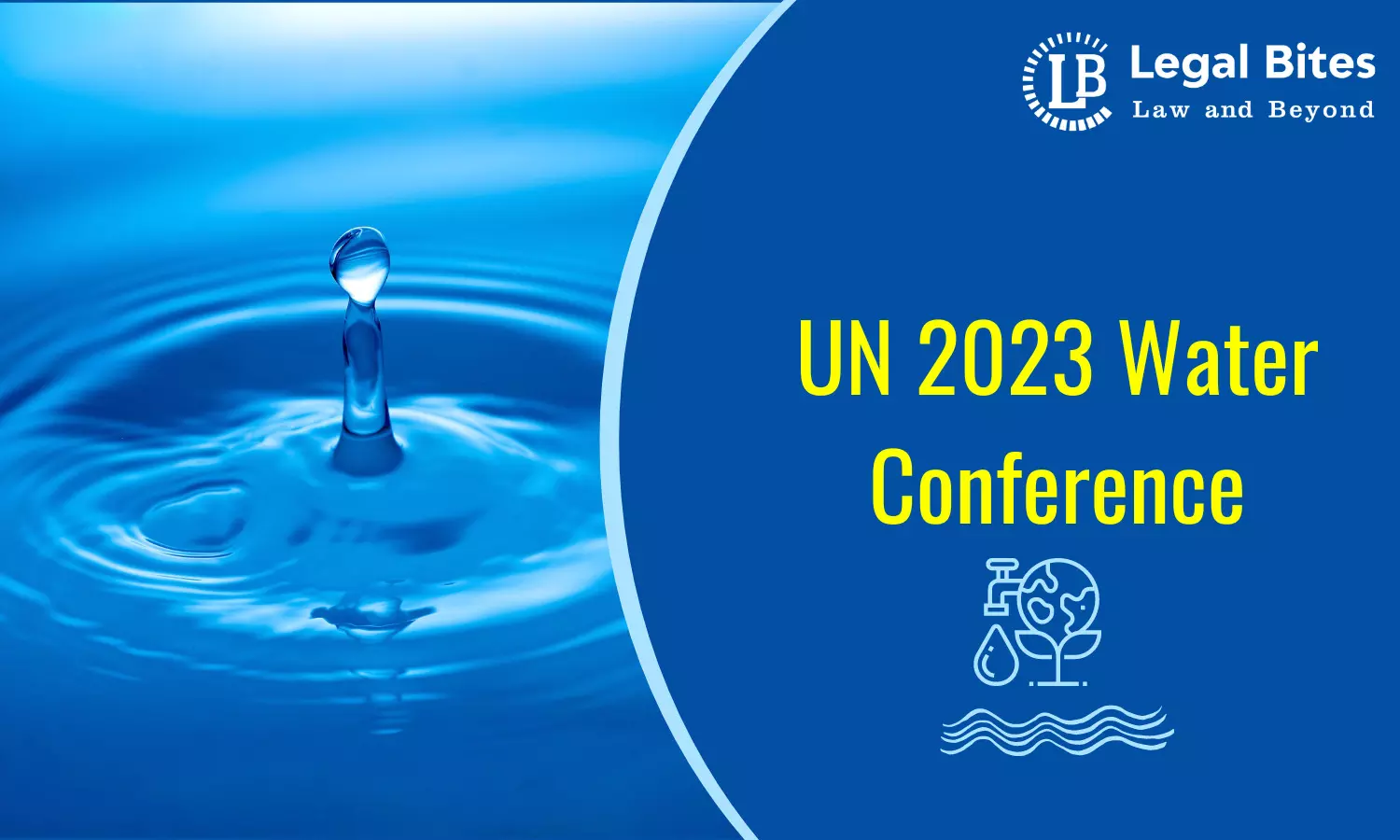UN 2023 Water Conference | #Must Know
Here is all the information about the UN Water Conference in 2023, which was convened to address numerous critical global challenges related to water.

Here is all the information about the UN Water Conference in 2023, which was convened to address numerous critical global challenges related to water. The conference aimed to explore potential solutions and strategies to address these pressing issues.
Introduction
Water could be an exceptionally basic component of living things. Water is an emergency because it is both a driver and casualty of climate alter. This is often indeed more shocking considering that if we come up short on water, we'll fall flat on all of the SDGs. Young ladies and ladies spend 200 million hours a day universally collecting water. A few 1.1 billion individuals around the world need to get to water.
Around 31% of schools around the world need to get secure water and satisfactory sanitation. The Water Action Agenda, deliberate endeavours of nations and partners to realize the Feasible Improvement Objectives (SDGs) and their water-related targets, was received in 2023 by the voluntary commitments of nations and stakeholders to accomplish the Sustainable Development Goals.
What is the UN Water Conference?
Individuals from numerous associations and countries come together at the water conference to collaborate on finding arrangements for the world's water issues. Even though most water-related issues are territorial, countries can collaborate to trade information, contribute to arrangements, and learn from one another. The UN 2023 Water Conference looked to advance the achievement of universal water-related objectives and destinations, such as those recorded within the 2030 Motivation for Maintainable Improvement.
Importance
The conference will focus on discussing the importance of wastewater reclamation and recycling in addressing the water scarcity issue. Moreover, the conference will highlight the benefits of decentralised technologies in wastewater management, as they can be installed on-site and contribute to the circular economy concept. By promoting wastewater reclamation and reuse projects, the conference aims to ensure sustainable water development and management, reducing the dependence on natural superficial water and groundwater sources.
UNWC 2023: Advancing Sustainable Water Management
Generally speaking, the UNWC 2023 meeting focused on recovery and reuse programs, guidelines on wastewater releases, advancing proficient tertiary treatment in metropolitan wastewater treatment plants, and underscoring the job of the Unified Countries Conduits Show in practical Water Asset Management. Emerging contaminants in wastewater reuse and the requirement for effective tertiary treatment to guarantee water quality were discussed at the conference.
All in all, the UNWC 2023 meeting gave a stage to worldwide conversations on practical water with a particular spotlight on wastewater recovery and reuse as a pivotal step towards tending to water shortage and guaranteeing the accessibility of perfect and safe water for all. To find solutions to the global water crisis, the conference emphasised the significance of international cooperation and the implementation of sustainable water management practices.
Purpose
The purpose of this conference was to address the challenges posed by increasing water scarcity and imbalances in the world's water distribution, as highlighted in the United Nations World Water Development Report.
By 2050, 66 countries representing 21% of the world's population could face severe water shortages, further underscoring the urgency for sustainable solutions.
Partnerships and collaboration will be significant themes during the conference, as underlined by the 2023 World Water Development Report. The conference built on the idea of Integrated Water Resources Management, which recognised the need to consider conflicting uses of water resources to achieve sustainability. We may begin to solve not only the water problem but also the greater environmental catastrophe that we are experiencing today by tackling the "politics of space" and investigating novel techniques such as co-producing ecological assets, such as rural ponds in Kerala, India.
The goal of the conference was to encourage all stakeholders to make pledges that focus on taking action. These pledges made the "Water Action Agenda," a framework for optional commitments and fresh, creative ideas.
Event Themes
There were five interactive conversations, six plenary sessions, an opening and closing session, and participant-organised side events throughout the conference. The SDG 6 Global Acceleration Framework's five accelerators Financing, Data and Information, Capacity Development, Innovation, and Governance serve as the organising themes for the five interactive discussions. The connections between water and the following topics were the subject of these interactive discussions: cooperation; the Water Action Decade; climate, resilience, and environment; and health.
• Water for Health: Human Rights to Safe Drinking Water and Sanitation, as well as Access to WASH
• Water for Sustainable Development: Water-Energy-Food Nexus, Water Valuation, and Sustainable Urban and Economic Development
• Source to Sea, Biodiversity, Climate, Resilience, and Disaster Risk Reduction (DRR): Water for Climate, Resilience, and Environment
• Water for Cooperation: Water Across the 2030 Agenda, Cross-Sectoral Cooperation, including Scientific Cooperation, and Transboundary and International Water Cooperation
• Water Action Decade: Streamlining the Goals of the Decade's Implementation, Including the UN Secretary-General's Action Plan
• Water-related issues plague nearly every nation on the planet, ranging from severe drought to flooding. 884 million people lack access to safe drinking water globally. In addition, waste, pollution, and climate change are placing more and more strain on our water supplies.
Sustainable Development
A feasible community takes into consideration, and addresses, different human needs, not fair one at the exclusion of all others. It could be a put where individuals of diverse foundations and viewpoints feel welcome and secure, where each bunch is situated at the decision-making table, and where success is shared. It takes a long-term point of view centring on expecting and adjusting to alter in both the show and the future.
A feasible community oversees its human, normal, and monetary capital to meet current needs while guaranteeing that satisfactory assets are accessible for future eras. We accept solid communities are the establishment of a tranquil and solid planet for humankind. We have concluded that climate alter, salary disparity, and social treachery are the greatest dangers to building solid, feasible communities and thus these challenges characterize our current needs.
Millions of people's employment, the security of nourishment and vitality, human well-being, and the environment are all altogether affected by water. "Clean water and sanitation for everybody." Be that as it may, as of right presently, we're slacking on this objective of all-inclusive, so we must step up our endeavours there.
To form a stage for developments that might alter the diversion, the governments of Tajikistan and the Netherlands, who are co-hosting the UN 2023 Water Conference, have presented the Water Activity Plan. Since the world will miss a few water-related targets, such as the 2030 Motivation for Maintainable Improvement, the objective is to assist water activity. Guarantees made must be perceptible and centred on taking activity. The Global Accelerator Framework for SDG states that, for example, to fulfil SDG on water and sanitation, our ambition must be increased fourfold. Governments cannot resolve this issue on their own instead, all facets of society must be engaged.
Conclusion
The UNWC 2023 conference provided a platform for global discussions and cooperation on sustainable water supply, with special emphasis on wastewater reuse and recycling as a key solution to water scarcity. The conference also emphasised the need to tighten sewage discharge and the importance of effective post-treatment in domestic sewage treatment plants. The ultimate goal of the conference was to ensure access to clean and safe water for all by promoting international cooperation and implementing sustainable water management practices.
References
[1] Achieving the SDGs requires Public-Private Collaboration on Water, Available Here
[2] Water – at the Center of the Climate Crisis, Available Here
[3] UN 2023 Water Conference, Available Here
Important Links


